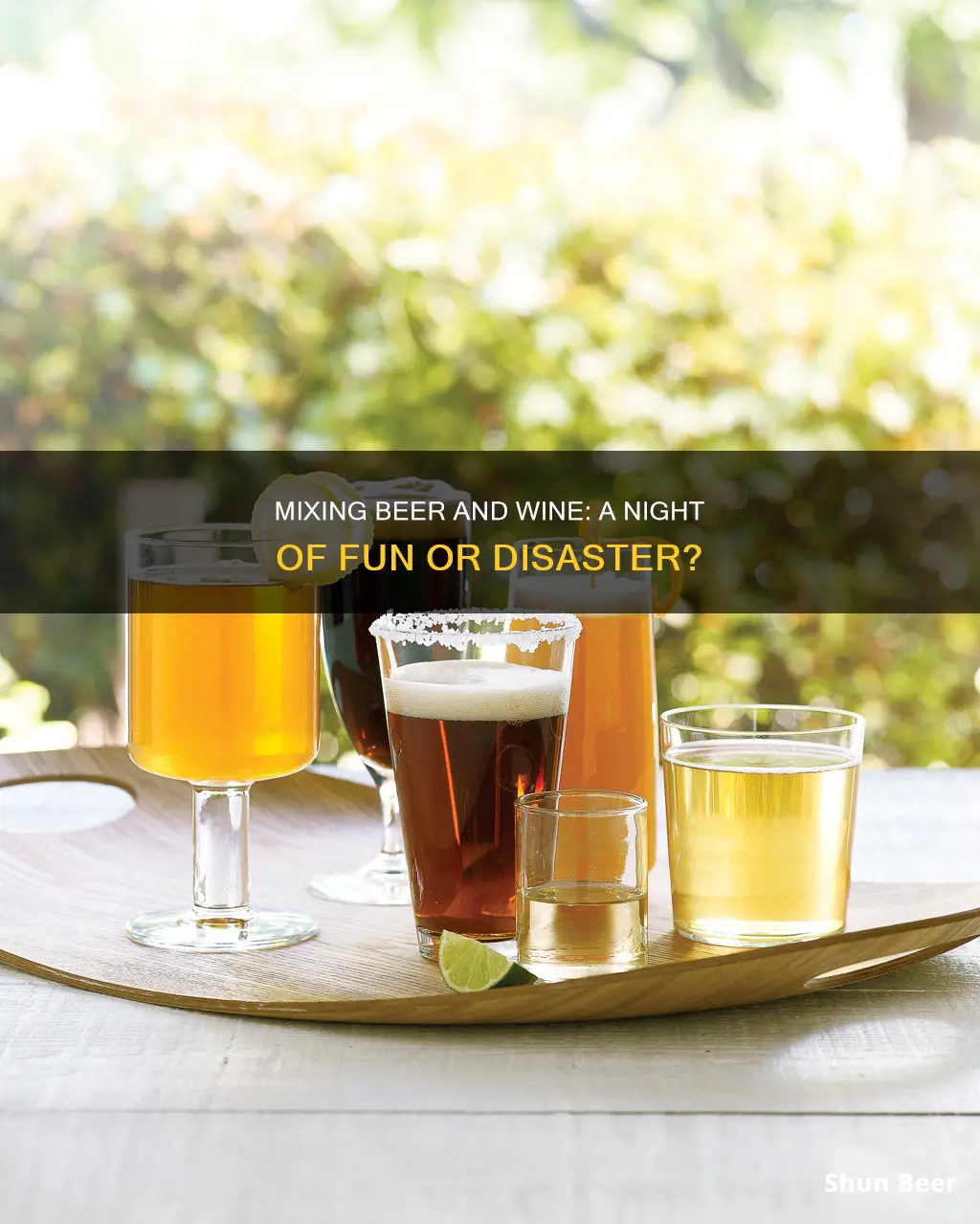
Drinking beer and wine in the same night is a topic that has been widely discussed and debated. Many people believe that the order in which you consume these alcoholic beverages can impact how you feel and whether you experience a hangover. There are even rhymes that offer guidance on this, such as beer before wine and you'll feel fine or wine before beer and you'll feel queer. However, is there any truth to these sayings, or is it just folklore? Researchers have conducted studies to examine whether the order of drinking beer and wine affects hangover symptoms and found that there was no correlation between the order of drinks and hangover intensity. The best predictors of a bad hangover were how drunk the participants felt and whether they vomited after drinking. So, while drinking beer and wine in the same night may not increase the likelihood of a hangover, excessive alcohol consumption can lead to negative consequences, and it is always important to drink responsibly.
| Characteristics | Values |
|---|---|
| Can you drink beer and wine in the same night? | Yes |
| Beer before wine? | You'll be fine |
| Wine before beer? | You may not feel great |
| Beer after wine? | You'll feel fine |
| Wine after beer? | You'll feel queer |
What You'll Learn

Beer before wine, you'll be fine
"Beer before wine and you'll feel fine" is a well-known saying that suggests drinking beer before wine can help prevent a hangover. However, recent studies have found this to be a myth.
The studies, conducted by researchers at Witten/Herdecke University in Germany and the University of Cambridge in the United Kingdom, examined whether the order of alcoholic drinks consumed affected the severity of hangovers. The researchers recruited 90 participants between the ages of 19 and 40 and divided them into three groups. Group 1 drank beer followed by wine, Group 2 consumed wine first and then beer, and Group 3 drank only beer or wine. The experiment was repeated a week later, with Groups 1 and 2 swapping drink orders.
The results showed no significant difference in hangover severity between the three groups. Participants in all groups reported similar hangover symptoms, regardless of the order in which they consumed alcohol. This finding contradicts the popular belief that drinking beer before wine will result in a milder hangover.
So, can you drink beer and wine in the same night without consequences? The study suggests that it's not the order of drinks that matters, but rather the amount of alcohol consumed. Drinking too much alcohol, regardless of the type or order, is likely to result in a hangover. The best predictors of a bad hangover are how drunk an individual feels and whether they vomit after drinking.
While the "beer before wine, you'll be fine" saying may be a myth, it's important to remember that drinking responsibly and in moderation is always the best approach. Knowing your limits and paying attention to your body's reactions to alcohol are crucial to avoid unpleasant hangovers and to drink safely.
The Magic of Appearing Beer: Trick Explained
You may want to see also

Wine before beer, you'll feel queer
There is a long-standing belief that drinking wine before beer can lead to a worse hangover than if the order is reversed. This idea is summed up in the saying, "wine before beer, you'll feel queer". However, recent studies have set out to test this theory and have found no truth in it.
One study, conducted by researchers at Witten/Herdecke University in Germany and the University of Cambridge in the UK, recruited 90 participants aged 19 to 40. The participants were split into three groups, with the first group consuming beer followed by wine, the second group consuming wine followed by beer, and the third group consuming only wine or beer. The experiment was then repeated a week later with the first two groups swapping their drink orders. Throughout the experiment, researchers asked participants to rate their level of drunkenness and any hangover symptoms.
The results showed no significant differences in hangover severity among the three groups, indicating that the order of drinking beer and wine does not affect the likelihood or severity of a hangover. This finding contradicts the "wine before beer, you'll feel queer" saying and suggests that it is a myth.
Another similar study, published by Harvard Health, also found no correlation between hangover symptoms and the order of drinking wine and beer. The study involved 90 adults, randomly assigned to one of three groups, with drinking orders similar to the previously mentioned study. Hangover symptoms were assessed after each drinking session, and the results showed no correlation between the order of drinks and hangover severity.
So, while the saying "wine before beer, you'll feel queer" has been passed down through the years, scientific studies have failed to find any evidence to support it. It appears that it is not the order of drinks that determines the severity of a hangover, but rather the total amount of alcohol consumed and individual factors such as perceived drunkenness and vomiting.
Beer and Doxycycline: Is It Safe to Mix?
You may want to see also

The amount of alcohol, not the order, causes hangovers
It's a common belief that drinking beer before wine, or vice versa, will affect the severity of a hangover. However, researchers at Witten/Herdecke University in Germany and the University of Cambridge in the UK have debunked this myth. In their study, 90 participants between the ages of 19 and 40 were divided into three groups, each consuming different combinations and orders of beer and wine. The next morning, the participants were asked to rate their hangover symptoms. The researchers found no significant differences in hangover severity among the three groups, concluding that it is the amount of alcohol consumed, rather than the order, that determines the intensity of a hangover.
The study also revealed that individual factors such as age, sex, body weight, and drinking habits did not seem to influence hangover intensity. Instead, two main factors that predicted a more severe hangover were vomiting and perceived drunkenness. The more intoxicated participants felt, the more likely they were to experience a worse hangover. This finding further reinforces the idea that it is the total amount of alcohol consumed, rather than the type or order, that influences hangover severity.
The belief that drinking beer before wine, or vice versa, affects hangovers may be attributed to the different congeners present in these alcoholic beverages. Congeners are compounds produced during fermentation, contributing to the taste and smell of the drink. Darker spirits, such as bourbon, tend to have higher levels of congeners, which could potentially worsen hangover symptoms for some people. However, the link between congeners and hangover severity is not yet fully understood, and more research is needed.
While the order of drinks may not matter, the amount of alcohol consumed certainly plays a crucial role in determining the severity of a hangover. This is because alcohol consumption disrupts various physiological processes in the body, leading to the typical symptoms of a hangover. Alcohol interferes with sleep patterns, causing fragmented sleep and early waking, which contributes to fatigue. It also irritates the stomach lining, increasing acid release and leading to nausea and stomach discomfort. Additionally, alcohol increases inflammation in the body, which may contribute to the overall feeling of sickness.
In conclusion, it is important to remember that the best way to prevent a hangover is to drink in moderation or abstain from alcohol altogether. While the order of drinks may not significantly affect hangover severity, excessive consumption of any alcoholic beverage is likely to result in a hangover.
Brita Water Filter: The Ultimate Beer Upgrade?
You may want to see also

Carbonation in beer may speed up the absorption of alcohol from wine
Drinking beer and wine in the same night is unlikely to have any impact on your hangover, according to a study by researchers at Witten/Herdecke University in Germany and the University of Cambridge in the UK. The study found that it doesn't matter whether you drink beer or wine first—it's the amount of alcohol consumed that determines the severity of a hangover.
However, one popular theory suggests that drinking wine before beer can lead to a worse hangover because the carbonation in beer may speed up the absorption of alcohol from the wine. This theory claims that the increased rate of alcohol absorption could result in greater inebriation and a more intense hangover.
There is some scientific evidence to support the idea that carbonation can affect alcohol absorption. Studies have shown that carbonation can increase pressure in the stomach, facilitating the movement of alcohol into the bloodstream via the stomach lining. This increased rate of absorption can make you feel drunk faster. However, it is important to note that this effect is temporary, and the overall level of intoxication at the end of the night will depend on the total amount of alcohol consumed.
While the carbonation in beer may have a minor influence on alcohol absorption, other factors such as drinking on an empty stomach, high alcohol content, drinking speed, and gender play a more significant role in determining how quickly you feel the effects of alcohol consumption.
Beer After Laparoscopic Gastrectomy: What You Should Know
You may want to see also

Beer and wine can be consumed in the same night without ill effects
The key factors contributing to a hangover remain the same, regardless of the type or order of drinks: the amount of alcohol consumed and the rate of consumption. The higher the alcohol content and the faster it is consumed, the more severe the hangover is likely to be. Individual factors such as age, sex, body weight, and drinking habits do not seem to play a significant role in predicting hangover intensity. However, vomiting and perceived drunkenness are strong predictors of a worse hangover.
While it is safe to consume beer and wine in the same night, it is important to practice responsible drinking. This includes pacing yourself, drinking responsibly, never driving under the influence, and knowing when to quit. Additionally, it is worth noting that clear drinks like white rum, vodka, and gin tend to cause fewer and less severe hangovers due to their lower congener content. Congeners are substances produced during fermentation, such as acetone and tannins, and are found in higher quantities in darker drinks.
In conclusion, when it comes to mixing beer and wine, the existing evidence suggests that hangovers are not caused by the combination itself but rather by the amount and rate of alcohol consumption. So, whether you start with beer or wine, remember to drink in moderation and listen to your body's signals to avoid unpleasant after-effects.
Beer and Pepto-Bismol: A Safe Mix?
You may want to see also
Frequently asked questions
Yes, you can drink beer and wine in the same night. However, it is important to drink in moderation and be aware of the amount of alcohol you are consuming.
There is no scientific evidence to suggest that drinking beer and wine in a particular order will affect how drunk you feel or how bad your hangover is. However, some people believe that drinking beer before wine is better, as beer is less strong than wine, so you are less likely to drink heavily later in the night.
Drinking any type of alcohol can have health risks, including dehydration, changes in hormone levels, and the toxic effects of alcohol. It is important to drink responsibly and in moderation.
It is important to pace yourself and drink plenty of water to stay hydrated. It is also a good idea to eat food before or while drinking to slow down the absorption of alcohol.







